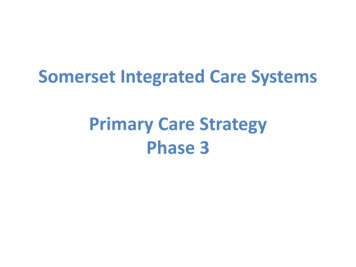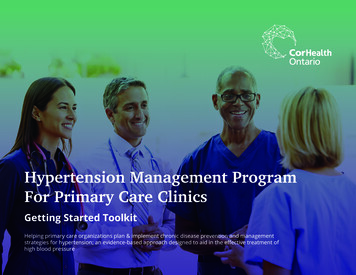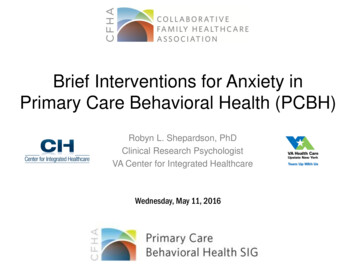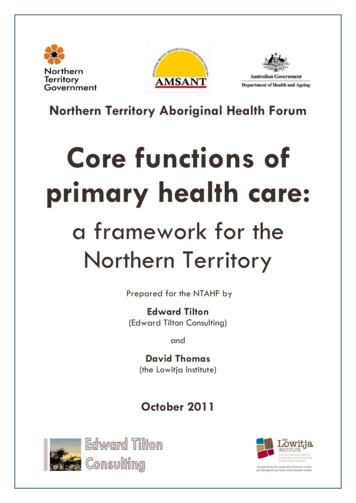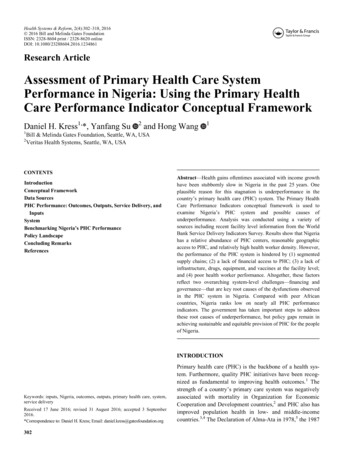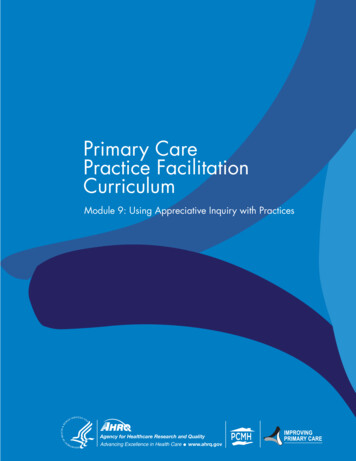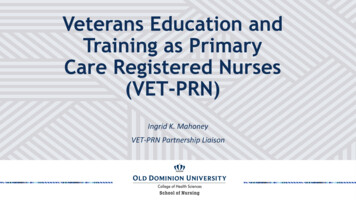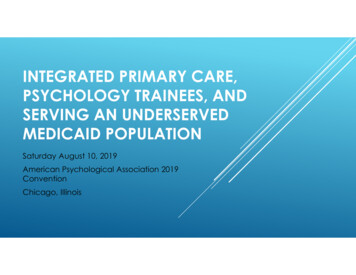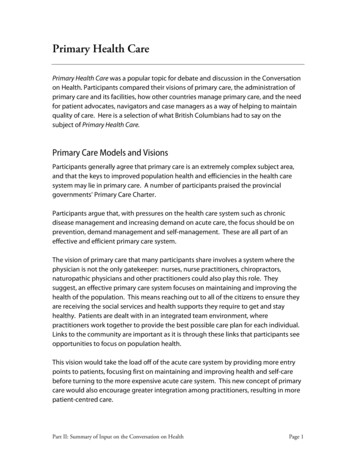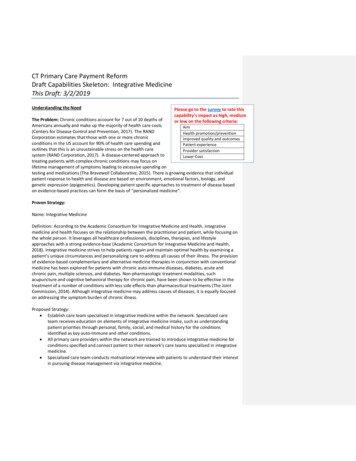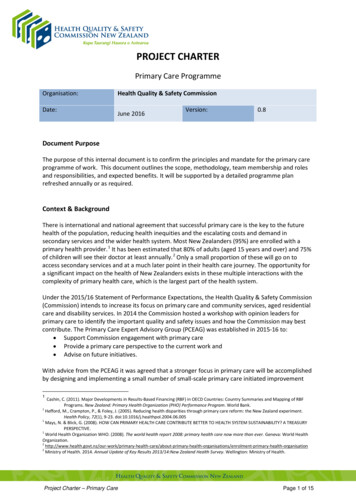
Transcription
PROJECT CHARTERPrimary Care ProgrammeOrganisation:Date:Health Quality & Safety CommissionJune 2016Version:0.8Document PurposeThe purpose of this internal document is to confirm the principles and mandate for the primary careprogramme of work. This document outlines the scope, methodology, team membership and rolesand responsibilities, and expected benefits. It will be supported by a detailed programme planrefreshed annually or as required.Context & BackgroundThere is international and national agreement that successful primary care is the key to the futurehealth of the population, reducing health inequities and the escalating costs and demand insecondary services and the wider health system. Most New Zealanders (95%) are enrolled with aprimary health provider. 1 It has been estimated that 80% of adults (aged 15 years and over) and 75%of children will see their doctor at least annually. 2 Only a small proportion of these will go on toaccess secondary services and at a much later point in their health care journey. The opportunity fora significant impact on the health of New Zealanders exists in these multiple interactions with thecomplexity of primary health care, which is the largest part of the health system.Under the 2015/16 Statement of Performance Expectations, the Health Quality & Safety Commission(Commission) intends to increase its focus on primary care and community services, aged residentialcare and disability services. In 2014 the Commission hosted a workshop with opinion leaders forprimary care to identify the important quality and safety issues and how the Commission may bestcontribute. The Primary Care Expert Advisory Group (PCEAG) was established in 2015-16 to: Support Commission engagement with primary care Provide a primary care perspective to the current work and Advise on future initiatives.With advice from the PCEAG it was agreed that a stronger focus in primary care will be accomplishedby designing and implementing a small number of small-scale primary care initiated improvement1Cashin, C. (2011). Major Developments in Results-Based Financing (RBF) in OECD Countries: Country Summaries and Mapping of RBFPrograms. New Zealand: Primary Health Organization (PHO) Performance Program. World Bank.1Hefford, M., Crampton, P., & Foley, J. (2005). Reducing health disparities through primary care reform: the New Zealand experiment.Health Policy, 72(1), 9-23. doi:10.1016/j.healthpol.2004.06.0051Mays, N. & Blick, G. (2008). HOW CAN PRIMARY HEALTH CARE CONTRIBUTE BETTER TO HEALTH SYSTEM SUSTAINABILITY? A TREASURYPERSPECTIVE.1World Health Organization WHO. (2008). The world health report 2008: primary health care now more than ever. Geneva: World nistry of Health. 2014. Annual Update of Key Results 2013/14:New Zealand Health Survey. Wellington: Ministry of Health.Project Charter – Primary CarePage 1 of 15
initiatives. These initiatives will act as a vehicle for engagement and provide a catalyst for futurespread and scale up along a development pathway.Strategic AlignmentThe 2015/16 Statement of Performance Expectations states that the Commission intends to increaseits focus on primary care. Through more purposeful work with the primary care sector, theCommission will be able to further extend its work from hospitals to the whole of the health anddisability system.The Commission wants to work in areas aligned to its own strategic priorities and capabilities, whereit is best placed to add value and that are also aligned to government priorities. This work is alignedto the Commission core programme area of improving capability and leadership. Work in PrimaryHealth Care also links to the 2016 Health Strategy theme of Closer to Home.Explicit primary care initiatives will contribute to the Commission’s current strategic priority ofassisting the sector to effect improvement. The programme has three priorities, which are toimprove: Equity– Inequity is currently one of the key focus areas for the Commission and thegovernment. Integration– Integration is a focus area from the theme of ‘One Team’ in the Health Strategy. Consumer engagement.– ‘Involving consumers’ is one of the core programmes of the Commission and a focusof the Health strategy theme ‘People Powered.’Problem statementThe primary care sector is intrinsically motivated to undertake quality improvement activities.However, we recognise that there are limitations in both capacity (funding and time) and capability(knowledge and skills) to undertake such activities. Further, there is a lack of integration acrossprimary care, for example between general practice and allied health professionals such aspharmacists, which creates artificial silos of health care.The complexity of primary health care means that it is difficult to identify quality improvementneeds. This is compounded by the lack of shared national data for improvement, such as consumerexperience, adverse events and complaints.The Commission does not currently have a high profile presence in primary care despite beingresponsible for health care improvement across the whole sector. The isolated and small scaleinitiatives that have been undertaken by the Commission in the sector have not benefitted from a coordinated approach. Further, the Commission has had limited knowledge of the primary health caresector. This has limited its ability to define where it is best placed to add value to primary health careimprovement.Project Charter – Primary CarePage 2 of 15
AimThe aim of the programme is to increase quality improvement capability in primary care.This will: Contribute towards the long-term aim of improving health outcomes, equity, consumerengagement and integration in primary health care. Be demonstrated by a greater than 15% increase in quality improvement knowledge in theparticipating practices throughout the 18 month programme.GoalsTo increase quality improvement capability in primary care the objectives can be described asfollows, they are: Collaborative partnerships between the Commission and primary care Training and education in quality improvement Sector led initiatives to build improvement expertise and capability Sector led initiatives to improve one or more health outcomes with associated improvementsin equity, integration and consumer engagement as applicable. Identification of initiatives with validity and transferability suitable for spread at a nationallevel Develop a base of primary health care improvement knowledge, both within primary care andthe Commission, from which to develop wider improvement initiatives across the spectrum ofprimary health care, for example pharmacy, in a phased approach over time.The Driver Diagram depicting the system levers to achieve this is shown in Appendix 1.BenefitsThe expected benefits from the primary care programme across the stakeholder groups includingconsumers are shown fully in Appendix 2. Expected benefits for the participating practices and theCommission are to: Develop stronger connection between primary care and the Commission to improve primaryhealth care quality. Increase primary care sector quality improvement leadership capability and knowledge Progress the equity, consumer engagement and integration agendas through work withprimary care on initiatives to demonstrate quality improvement. . Increase the capacity and capability within primary care in “Improvement Science” andcollaborative improvement methodology. Improve patient outcomes related to specific improvement activities. Advance the Commission’s understanding of primary health care by working with theprimary health care sectorProject ScopeThe Commission will focus on areas aligned to Commission strategic priorities and areas of expertiseand avoid duplication of effort in the areas of quality assurance (e.g. Cornerstone) and patient safety(e.g. Safety in Practice).Initiatives will be selected using prioritisation criteria developed by the PCEAG and based on the draftCommission prioritisation criteria (Appendix 3) areas of: Strategic alignmentProject Charter – Primary CarePage 3 of 15
Benefits RealisationsEquityValue for moneyIdeally, by starting with 3 to 4 small-scale initiatives within primary care, a quality improvementapproach will be enabled. Innovative approaches can be tested at a small scale for their applicabilityfor scale and spread. The aim will be to build knowledge and offer potential for transformationalchange across the wider primary health care sector.We envisage initiatives would be led by general practice and supported through collaboration withthe PHO to the level of that individual PHO capability. We will consider applications from otherprimary care providers which do not have a general practice focus, which might include Māori healthproviders that do not have a general practice component.The Commission will provide reimbursement of staff time of up to 6000 excluding GST. In additionthe Commission will fund travel and accommodation costs. This funding is to release staff to work oninitiatives and attend learning sessions.Applicants will be free to submit initiatives of their own choice that are important to them and theirenrolled populations, but all must be aligned to one or more of the three priority areas:1. Equity – all initiatives must be underpinned by consideration of equity in the design,implementation and evaluation phases.2. Consumer engagement – consumer co-design will enable initiatives to move from ‘consumerexperience’ to ideally reflect consumer journeys through health, including their impact onquality of life.3. Integration – Integrated patient-centred care will be a key priority, targeting the vertical gapbetween primary care and secondary care or the horizontal gaps across primary care, forexample with allied health professionals such as pharmacists and physiotherapists and withother social sector services from the consumer perspective to provide seamless transitions ofcare.Phased approach:The Commission has a long term commitment in partnering with primary care and building qualityimprovement capability. The future plans, beyond this first phase of proposals being sought, willdepend on the number and suitability of the initiatives identified. We are confident that there willbe future opportunities to be involved as we develop a phased approach to new initiatives identified,with a balance between those in development and refinement, and those that have progressed to“scale up” and broader implementation.Phase 1Year 16/17Phase 2Year 17/18Phase 3Year 18/19Identification of initiativesPhase 1 initiatives evaluatedRevised initiatives spreadInitiatives tested through iterativecycles and collaborationSuccessful initiatives revisedfor regional/national spreadand call for new initiativesBegin work on new initiativesBuild primary care network andimprovement capabilityBuild primary care networkand improvement capabilityBuild primary care network andimprovement capabilityProject Charter – Primary CarePage 4 of 15
This will be an adaptive process and will respond to feedback from the participating primary healthcare organisations in regard to phase 2 and 3 programme design.Sustainability:Sustainability of both the successful initiatives and the ability of the Commission to continue tosupport new primary health care initiatives is a key consideration and will be monitored throughoutthe programme. This will require the programme to move between a mix of quality improvement,initiative spread strategies and quality control activities without losing the ability to add value at allof these levels.Methodology – Phase 1To select the initial primary care quality improvement initiatives, we will run an expression of interestapplication process.The application process will be run in 5 stages which consist of:Stage 1:Expression of interest applications to be received from the sector(template will be provided)A selection panel will review all the applications and construct a shortlist ifrequired.The Commission will work closely with shortlisted applicants to submit fullproposals (template to be provided)A selection panel will evaluate full proposals and select 3-4 applications.Stage 2:Stage 3:Stage 4:Stage 5:Negotiation of a memorandum of understanding will be undertakenbetween selected applicants and the Commission.Once applications have been confirmed, we will work with the successful applicants to get initiativesestablished. A project manager and quality improvement advisor will work with the individualinitiative teams to support as needed. This will include site visits, regular meetings, qualityimprovement advice and facilitation.We will use methodology similar to the Institute for Healthcare Improvement Breakthrough Series(Collaborative) methodology and utilising the Model for Improvement (www.api.org). We will bringinitiative teams together for three learning sessions to facilitate quality improvement capabilitybuilding, sharing and of information, learning and the formation of natural networks. The location ofthe initiative teams will guide the location of the learning sessions and network building. In theaction periods between the learning sessions on-site support will be provided by the QualityImprovement Advisor and the Project Manager.MilestonesMilestonePhase 1 start-up: Call for expressions of interestFinal applicant and sector notificationCommence initiatives workPhase 2 start-upPhase 3 start-upProject Charter – Primary CareDate1 July 201620 December 20161 February 20171 July 20181 July 2019Page 5 of 15
MeasuresThese measures are high level programme measures related to the programme aim and objectives.Each initiative will have an appropriate measurement plan to demonstrate improvement and changerelated to the topic of their choice and to include measures relating to equity, consumer experienceand integration.Outcome Measure Increase in improvementknowledge from baselinemeasures by April 2018(measured pre, mid andpost initiative)Outcome measures relatedto the specific primaryhealth care improvementinitiatives. An improvementis demonstrated in: Equity Consumer experience Integration Health care outcomes,as demonstrated byimprovement inSystem LevelMeasures (e.g. ASHrates) and localContributoryMeasures which willbe the project specificmeasures Process MeasureNumber of initiativeapplications receivedAttendance attraining/meetingsNumber of onsite visitsWebpage hitsNumber of changes testedat each participating siteIncrease in primary carestakeholder contactsDistribution of submittedand selected initiatives byenrolled population decileand demographicsHours of QI coachingNumber of personnelparticipating in each siteNumber of consumersparticipatingFeedback from projectteam members onconsumer engagement Balancing MeasureIndividual initiative projectmeasuresSatisfaction of participantsin training/meetingsPrimary health carepersonnel hours devoted tothe initiative and trainingProgramme EvaluationAn independent evaluation of this programme will be commissioned so that key learnings arecaptured and used to inform future improvement work by the Commission in the primary health caresector.The evaluation will be designed using the Commissions ‘Overarching Evaluation Framework: QualityImprovement Programme’ (2015). The design will aim to answer both process and outcomequestions about the programme and will be informed by advice from the PCEAG. The measurescollected as part of the programme and the specific initiatives will assist in this evaluation.Programme ConstraintsKey constraints include: The sectors capability and/or capacity to undertake quality improvement initiatives.Other competing priorities (i.e. Cornerstone Accreditation and Foundation StandardsCertification).Funding to meet ongoing programme expectations.Project Charter – Primary CarePage 6 of 15
Roles and ResponsibilitiesRolesPrimary Care ExpertAdvisory GroupClinical lead/ChairClinical AdvisorProject managerProject sponsorQuality improvementadvisorResponsibilityProvide independent sector-wide advice to the CommissionProactively support effective relationships between primary care andthe Commission Make recommendations to the Commission on strategies to improvethe quality and safety of health and disability services with a focus onprimary care services that are informed by evidence and national andlocal knowledge Share information that supports a national approach to quality andsafety improvements Foster an integrated approach to improving the quality and safety ofhealth and disability services with other Commission programmes.See Appendix 5 for Terms of Reference Spokesperson for the EAG and the programme. Publicise and promote the initiatives and programme in general Help the project manager and quality improvement advisor to developa charter, topic content, and measurement strategy Support teams during the ‘action periods’ e.g. answering subjectmatter questions, providing examples of success or challenging teams Attend expert advisory and PHO quality Improvement Networkmeetings Provide feedback to the expert advisory group regarding progress Publicise and promote the initiatives and programme in general Help the project manager and quality improvement advisor to developa charter, topic content, and measurement strategy Support teams during the ‘action periods’ e.g. answering subjectmatter questions, providing examples of success or challenging teams Attend expert advisory group meetings Support team by answering subject matter questions Oversee all aspects of the programme Risk escalation Secretariat support for EAG Co-ordinate learning sessions, and action period activities Set up meetings, webinars and learning sessions Co-ordinate learning sessions and conference calls Provide oversight, guidance and advice to the national team Approve the budget and oversee expenditure Attend steering group meetings Regularly assess collaborative progress against agreed timelines andreviews risks and mitigation strategies Develop the measurement system with the assistance of the projectmanager Teach and coach teams on process improvement Assess progress in the collaborative and identify necessary changes inkey technical content, measurement, and use of improvementmethods Support collaborative learning throughout the action periods Project Charter – Primary CarePage 7 of 15
Appendix 1: Primary Care Programme Driver DiagramEAGMeetingsPHOQINCross chair representation at meetingsand shared workspacePresentations/booth at Primary basedconferences e.g. RNZCGP QualitySymposium & Goodfellow SymposiumCollaborativepartnerships betweenthe Commission &primary careGrow and maintain sectorrelationshipsCollaborate with and seekendorsement from RNZCGPIdentify and use all opputunities forrelationship buildingConnect with Let's P.L.A.NConnect/promote consumerexperience surveyConnect with internalprogrammesStay IndependentSerious Adverse EventsAtlas of Healthcare VariationLearning sessionsIncrease QualityImprovementcapability in PrimaryCareSite and initative specific meetingsand sharing of learningPHO/Practice visitsTrainiing & education inquality improvementOnsite supportTeleconference/webinarsData toolsMeasurement andEvaluationProgramme evaluationPlan for spread and sustainabilityEOI processIniatiative delvelopmentPrimary health teams supported byCommissionDevelop communication approachesSector led initiativesSector communicationInvolve/inform DHB and PHOConsumer on inititative teamsConsumer engagementConsumer advisor on Commissionsteering groupProject Charter – Primary CarePage 8 of 15
Appendix 2: Expected Stakeholder BenefitsConsumers Primary Health CareImproved healthoutcomes.Improved consumerexperience.Increase in consumerengagement.Co-design and/orparticipation inimprovemen
Project Charter – Primary Care . Page 2 of 15 . initiatives. These initiatives will act as a vehicle for engagement and provide a catalyst for future spread and scale up along a development pathway. Strategic Alignment . The 2015/16 Statement of Performance Expectations states that the Commission intends to increase its focus on primary care.
